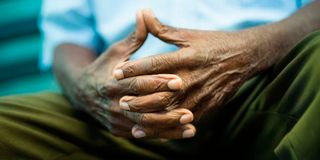Only a small number of people will reach retirement age in good health

Only a handful of people will attain retirement age in good health.
What you need to know:
- Life expectancy in Kenya is 67.21 at the moment, which is slightly above the average life expectancy age in Africa — 56.5 — according to latest demographic statistics by Macro Trends.
- Kenya’s life expectancy has been gaining ground in the last decade after plummeting in the late 1980s from 60 years to 50 years in the 90s, majorly attributed to HIV/Aids.
A new research has revealed that only a handful of people will attain retirement age in good health.
According to the report released by the Institute for Public Policy Research and (IPPR) Future Health, most people will be afflicted by various debilitating diseases by the time they receive their pension pay, making it hard to enjoy their long-awaited retirement age.
The study indicates that while life expectancy in general has increased since 1970s, the number of years people spend in poor health has equally increased.
Out of 10 boys born in the United Kingdom today, only less than one will be in good health by the time they collect their pension.
Similarly, just one in every six women will be without diabetes, arthritis or debilitating back ache when they reach retirement.
Male children born between 2013 and 2015 will live a healthy life for 63.4 years on average and then spend another 16.1 years in ill health before passing on, as indicated by official government figures in the UK.
Female children on the other hand will remain healthy until the age of 64.1 years on average before they start ailing for another 19.1 years.
Led by IPPR principal research fellow Chris Thomas, the researchers noted that children of the current generation are anticipated to spend most part of their last two decades in life bedevilled by paralysing health conditions such as dementia and arthritis.
The report further warned that people born in impoverished parts of the world deteriorate health-wise “more than 10 years before reaching retirement age.”
“It is shocking that very many people do not even make it to the age of retirement before the impacts of ill health start to afflict their lives,” stated Thomas. The experts singled out smoking, lack of exercise and obesity as the main causative factors of tormented old age, arguing that it is very preventable.
“The fact that poorest nations are more likely to suffer ill health earlier indicates that this is preventable. Making sure that more people are able to live the better part of their lives in perfect health is possible,” clarified the academics in the report.
“Key part of achieving this is by ensuring we have in place a sustainable NHS that is capable of improving the health of the masses even during hard times.”
In Kenya, the mandatory retirement age is 60 years for public officials while that for persons living with disabilities is 65 years.
The Public Service Commission in 2009 reviewed upwards the mandatory retirement age for civil servants to 60 years from 55 years. The move was intended to cushion the public service from losing employees with essential skills while they are still productive.
The age at which a person can begin collecting their pension pay currently stands at 66 years in Britain.
Despite spirited efforts by experts to dissuade lawmakers, the UK’s retirement age is set to rise to 67 in 2028 and 68 by 2037.
Life expectancy in Kenya is 67.21 at the moment, which is slightly above the average life expectancy age in Africa — 56.5 — according to latest demographic statistics by Macro Trends.
Kenya’s life expectancy has been gaining ground in the last decade after plummeting in the late 1980s from 60 years to 50 years in the 90s, majorly attributed to HIV/Aids.
In England, life expectancy is 82.9 for women and 79 for men.



